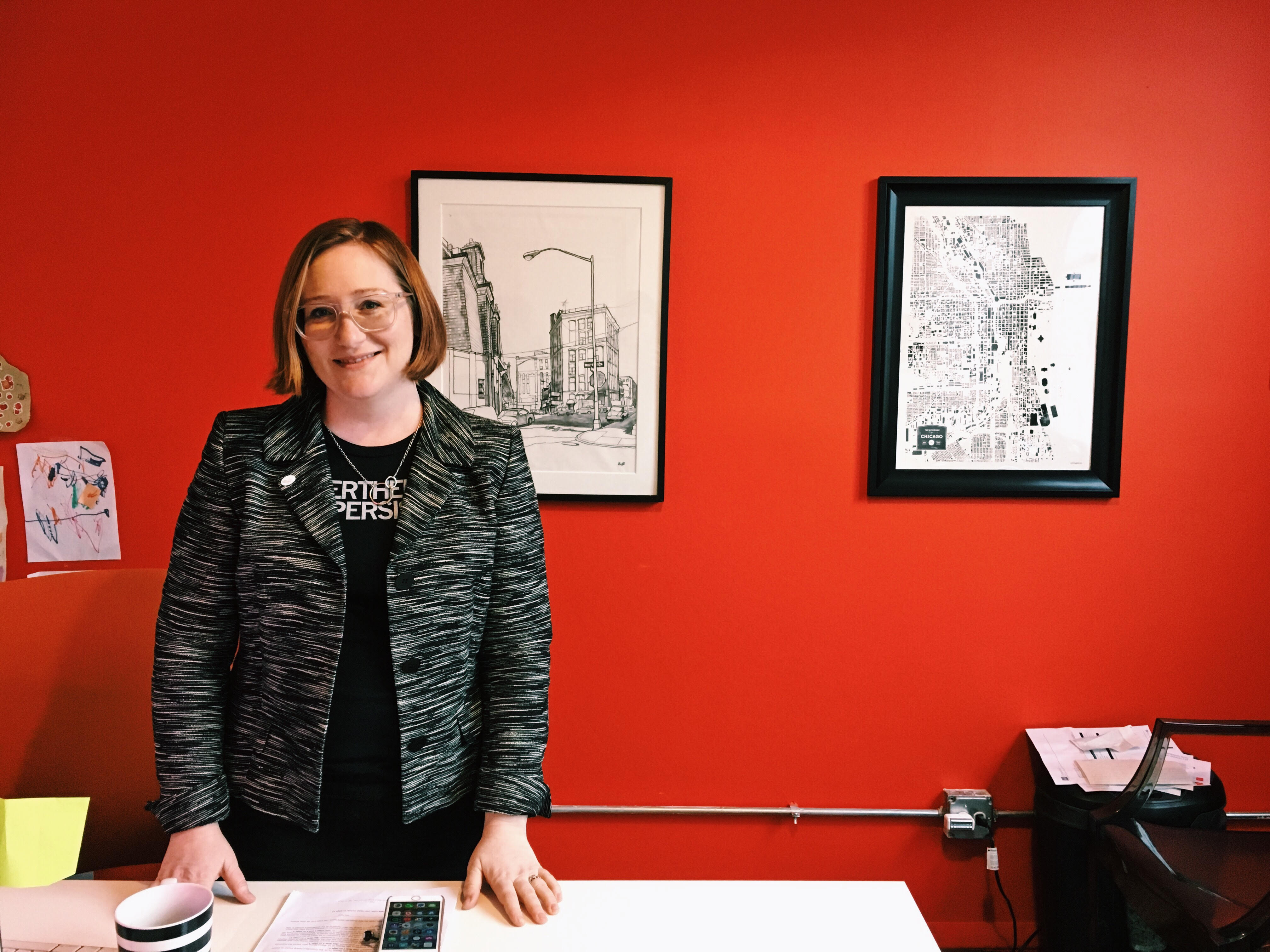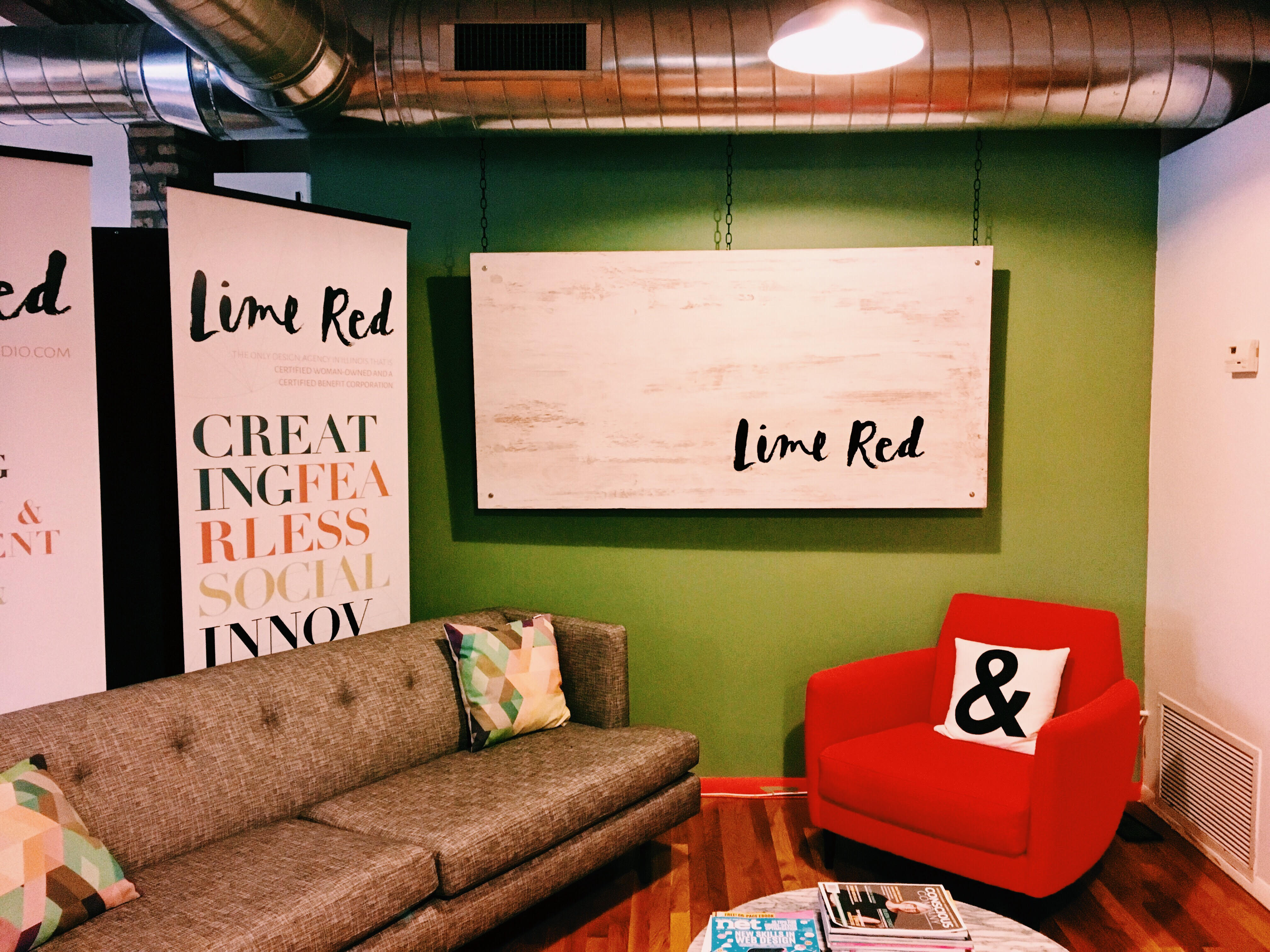Now Playing
Current DJ: Sarah A.
The French Goodbye Manitoba from Sueños Son Sueños (Roydale) Add to Collection
Requests? 773-DJ-SONGS or .(JavaScript must be enabled to view this email address)
LimeRed is a local user experience (UX) firm that develops design and UX projects that emphasize social justice and innovation. Since the firm was founded in 2004, they’ve also garnered certifications as both a woman-owned business (WBE) and a Certified B Corporation (B-Corp), meeting high standards of social and environmental performance as well as public transparency and accountability. This is an especially impressive feat as Chicago is only home to 21 B-Corps and fewer than half of those businesses are woman-owned.
In the spirit of local community-building and cross-organizational efforts, CHIRP Radio Features Director Amelia Hruby spent a morning at LimeRed recently with founder and company President Emily Lonigro Boylan and Strategy Director Demetrio Cardona-Maguigad.
Amelia: How did LimeRed get started?
Emily: I started my company because I had a computer, one client, and big ideas. I didn’t know anything. After college, I had been living in Chicago and working at agencies and on social justice projects, but I moved to New York because I had nothing to lose. So I was running my own little business with clients, larger agencies, and smaller non-profits. I kind of had a 50/50 split between New York and Chicago. It was going well, and that’s when I incorporated LimeRed.
At that point I was freelancing for a company that did luxury design goods. Most of their clients were luxury e-commerce, cosmetics, travel and real estate, and that’s really where I learned everything online. But the stuff I was selling, I just couldn’t do it. So I quit and said “I can’t do this anymore.” I decided that I had to stay true to what I think and do small business and non-profit and social justice and blend it all together, because you can’t be two people, it just doesn’t work.
Amelia: How did you end up back in Chicago?
Emily: I moved back to Chicago right before Obama got elected in 2008 and the market tanked, which was very much a test of how committed I was to this. But in 2009 I did okay. In 2010 I hired my first employee, and then every year until 2014 I doubled in size and revenue. Then 2014 was a market shift and almost every agency struggled. But I didn’t go under or let anyone go, and we’ve been reformulating since then.

Amelia: What does it mean to you for LimeRed to be a B-Corp and a WBE?
Emily: I started my company under the impetus of the social justice movement of 2003-5, so we’ve always done social justice work and wanted to do that work. So when we became a B-Corp in 2014, so it was nice to get that stamp of approval for the work we’d been doing.
And we’ve been a WBE for six or seven years, but honestly for most of that time, I felt like nobody cared. We got maybe one job because we were in the state business enterprise program list, but other than that there was pretty much no recognition of the fact that LimeRed was a woman-owned business.
That said I think that the combination of the two is really powerful right now.
Amelia: How do you see that combination impacting your business lately?
Emily: I think people are beginning to take notice of women’s inclusion in and ability to run businesses, and they’re becoming concerned with socially conscious businesses.
Being a WBE and B-Corp was always something under the radar that we put on our website and I would talk about, but it wasn’t who we are totally. I feel like in the past year, I’ve taken steps to be more public about our status. And especially being a B-Corp, I’ve attracted a lot of talent that believes in that values. That really has changed our culture and what we do and how we think about our work. It’s also changed who we’re attracting. We’re attracting the coolest, best, neatest work, because we’re being public about our viewpoint.
I want to know that I’m buying things from a company that has a B-Corp or a fair trade seal. As silly as it sounds, even my hand lotion is anti-human trafficking. I’m going to buy hand lotion any way, so I want it to stand for something.
I think it’s a good time to really talk about what we’re doing as a B-Corp, as a woman-owned business, and as a company full of women.
Amelia: How is social justice more at the forefront of LimeRed’s work now?
Emily: Social justice is definitely infused into how we work, and we’ve built social justice into our company values. That value list includes keeping our commitments to ourselves, each other, our clients, and our community. It means staying dedicated to keeping our work human-centered and recognizing the different states of being and contexts that people come to us with. It also requires making sure our work and office aren’t hierarchically organized. No one is above doing the dishes here; we all order office supplies; we all take out the garbage.
Our core value, I think, is that we champion our causes and community, and if we see an injustice, we help. We’re really trying to do the right thing in every way, blending it all together. There’s a lot.
Amelia: How did you get involved with UX work?
Demetrio: My background goes way back to organizing for immigrant rights and youth rights in the Filipino community in the late 90s. I worked with a lot of undocumented caregivers. I organized students on various university campuses. So I have a very social justice foundation.
Web and digital tools were just emerging during that time, and one thing I realized doing that work was that people didn’t really know what we were actually doing. That motivated me to figure out a better way to broaden audiences and communicate more effectively. So I went back to school to study web design and that gave me a basic foundation in how the web is a tool to empower people by sharing knowledge and information. Since then I’ve used that knowledge to work with a number of organizations designing strategies for communication and education, converging systems thinking and design thinking for non-profits and other organizations.
Amelia: What does the social and political positioning of LimeRed mean to you?
Demetrio: Often when people say UX they’re talking about user experience as user interface design. But user interface design is really just how you place things on a digital page so that a user can click on it; it’s very two-dimensional. But user experience has three dimensions. You’re not looking at the design on a page, but the time spent by the user interacting with the product.
So I’ve always worked hard to make sure that everything we create here is designed for people. We want to make sure that our user experience design is human-centered and that we are using problem solving to build strategies and designs that advocate for people. UX to me is all about time and the journey, and that’s what we’re working to do here at LimeRed, to take users on a journey.

Next entry: In Rotation: TALsounds
Previous entry: @CHIRPRADIO (Week of June 19)